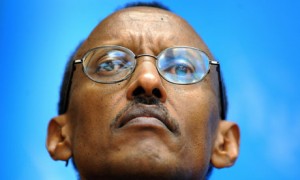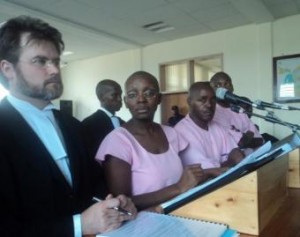Kagame’s Judicial System Naked in Ingabire’s Trial: Defense Right Denied
by Aimable Mugara
November 1, 2011 – Imagine if you were on trial for crimes punishable with up to 30 years in jail. Imagine if the judges then told your lawyers that the lawyers have no right to cross-examine the state´┐Żs so-called witnesses. This is what happened this week in the capital city of Kigali, Rwanda where opposition leader Mrs. Victoire Ingabire is on trial. Mrs. Ingabire is on trial for charges widely considered by human rights activists worldwide as politically-motivated. Originally, when the defense lawyers asked for time to do cross-examination of the state´┐Żs witnesses, the judge had granted this wish. In fact, the judge called up the first witness to take the stand.
As the witness approached the stand to be cross-examined, something quite strange happened. The prosecutor protested. The exchange between the prosecutor and the judge made it clear who is the boss in that court. In order to placate the prosecutor, who is clearly the one in charge, the judge asked the defense to submit written questions to the judge in advance. Once the judge has had time to review the questions (days, not hours), the judge will then decide which questions the defense can ask the witnesses and which questions should not be asked. If you are thinking that the judge will pass these questions over to the so-called witnesses during that period, you are probably right. After all, for politically-motivated charges we need to make sure that the so-called witnesses have enough days to rehearse their answers.
The entire charade was a stark reminder of the show trials that took place in the Soviet Union in 1936 to 1939. In an essay by Gudrun Persson, it is said that ´┐ŻStalin had won the struggle for power and was now dealing death blows to the opposition by organizing uncontrolled terror at every level of society. The purges carried out within the party, the army, among members of the scientific community, artists and prominent cultural figures came to be known as the Great Terror. The term is actually bizarre; terror is hardly a rank great or small but absolute: once it has taken root in a social system it spreads and acquires a life of its own.´┐Ż
You can easily replace the word Stalin with the words General Kagame and the above context will remain accurate while describing today´┐Żs Rwanda. Rwanda´┐Żs society is so terrorized and in order to keep the masses terrorized, General Kagame´┐Żs regime makes it a point of crushing every single opposition leader that dares speak out against the government. It is in this context that the Stalin-style show trials have been taking place, with each opposition leader being locked up one after another despite their glaringly obvious innocence.
But then again, the self-proclaimed president of Rwanda, General Kagame recently told BBC that ´┐Żany elections are better than no elections at all.´┐Ż He was referring to last year´┐Żs so-called presidential elections where all real opposition political parties were banned from participating and all opposition leaders jailed. Elections that were preceded by the beheading of the Rwandan Green Party´┐Żs Vice-President. Elections that were preceded by the killing of a journalist, the jailing of several other journalists, the shutting down of the few remaining independent newspapers and the expulsion from the country of a Human Rights Watch researcher. According to General Kagame, such elections are better than no elections at all. So, by the same logic, Mrs. Victoire Ingabire should apparently be grateful that she had any ´┐Żtrial´┐Ż at all, instead of being summarily executed like the millions of Rwandans and Congolese that have been killed by General Kagame´┐Żs soldiers in the past 21 years. The question on General Kagame´┐Żs mind today seems to be a very simple one. Why can´┐Żt opposition leader Mrs. Victoire Ingabire quietly go to jail where all opposition leaders belong, pretty please?
Related:
Rwanda: Ingabire´┐Żs Defense Counsel Denied Cross-Examination Right
November 2, 2011 No Comments
Rwanda: Ingabire’s Defense Counsel Denied Cross-Examination Right
by Boniface Twagirimana
Kigali, November 01, 2011 – On the request of the National prosecution authority the High Court retracted its previous authorisation and denied the defense counsel the right to cross-examine the prosecutor´┐Żs witnesses on terror charges. The presiding judge ordered the defense team to pre-submit a list of all the questions in order to decide which one could be discussed in open court and allow sufficient time for preparation by ´┐Żthe witnesses´┐Ż. This is another slap in the face of the lawyers who believed that some fairness was possible in this kangaroo trial. ´┐ŻThis process is a circus, it´┐Żs not fair and the international community needs to know the truth´┐Ż, said one foreign analyst based in Kigali.
Since the 27th October 2011, the political prisoner Ingabire exposed the terror charges. All the prosecutor´┐Żs witnesses in this trial are officially ´┐Żco-accused pleading guilty´┐Ż. The Rwandan criminal law procedure in its article 59 is clear on this: ´┐ŻPersons against whom the prosecution has evidence to suspect that they were involved in the commission of an offence cannot be heard as witnesses´┐Ż. (LAW N´┐Ż 13/2004 OF 17/5/2004 RELATING TO THE CODE OF CRIMINAL PROCEDURE, O.G SPECIAL N´┐Ż OF 30/07/2004). Questioned on this blatant violation or disdain of the law, the national public prosecution authority claims that ´┐Żthose people are criminals just pleading guilty and helping justice to halt a terrorist leader. Their information is used only for investigation and completion of pieces of evidence. They are not witnesses and could not be treated like that´┐Ż. The terms of this blind plea are not clear as all the co-accused don´┐Żt seem to care about their freedom.
The whole file on the counts of forming an armed group with the aim of destabilising the country, complicity to acts of terrorism and conspiracy against the government by use of war and terrorism are based on arranged statements from the so called co-accused. And now the direct cross-examination procedure is refused.
The terror evidence can´┐Żt be challenged in open court any more. ´┐ŻThis is not a common-law system, the defence lawyers can not just ask direct questions to those people. They could just give them to the court that will screen their relevance before giving people enough time to prepare their responses´┐Ż, warned Mr. Bonaventure Ruberwa, one of the pleading prosecutors.
The prosecutor justified the arrest of the political leader Victoire Ingabire by documents and material seized after the arrest of suspect Vital Uwumuremyi on 13 October 2010. Later on the cases of 3 other ex-soldiers already in military detention were adjoined . The first contradiction is that she was previously questioned on the content of the pieces of evidence before they were officially obtained. The arrest warrant of the key witness Vital Uwumuremyi is posterior to the arrest of the political leader. The material produced in front of the High court is composed by emails, small amount of money transfer forms and interrogations. The prosecution has failed to get any of those documents authenticated. The emails dates are contradicting. For example the headers of a response to one email written by Vital Uwumuremyi show that it was sent before the actual mail it was responding to. Some mails have clearly been written by the same suspect to himself using different pseudonyms and fakes names he confessed are his during the identification process. The name of Madame Victoire Ingabire is not mentioned nowhere on money transfer forms.
The key witness of the prosecution is known as Major Vital Uwumuremyi, ex member of the Forces Arm´┐Żes Rwandaises (ex-FAR), ex- FDLR. He stated himself that he was repatriated early 2009 after he reached the rank of Major. He does not have an ex-FAR identification number (matricule), he does not have any Officer identification number given by the former army simply because until the end of genocide, he was a civilian driver. The information that he was promoted to the rank of Major in Rwanda or in the Democratic Republic of the Congo or in the FDLR rebellion is no where to be confirmed.
If no serious correction, we are absolutely and irrevocably convinced that the continuation on this pace is a validation of flawed proceedings of a kangaroo trial.
Boniface Twagirimana
Interim Vice-President
FDU-Inkingi
November 2, 2011 No Comments


